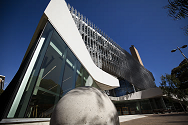Thursday 24 May, 5:30 – 7:00pm
Richard McGregor, East Asia, Lowy Institute
Theatre 1, 207-221 Bouverie St (Building 379), The University of Melbourne
 If the United States helped lay the postwar foundations for modern Asia, now the anchor of the global economy, Richard McGregor will speak how that structure is now crumbling, something he has chronicled in his new book, Asia’s Reckoning.
If the United States helped lay the postwar foundations for modern Asia, now the anchor of the global economy, Richard McGregor will speak how that structure is now crumbling, something he has chronicled in his new book, Asia’s Reckoning.
For more than half a century, American power in the Pacific has successfully kept the peace. But it has also cemented the tensions in the toxic rivalry between China and Japan, consumed with endless history wars and entrenched political dynasties. Today, the combination of these forces, together with Donald Trump’s unpredictable impulses and disdain for America’s old alliances, threatens to upend the region and accelerate the unravelling of the postwar order.
Richard McGregor is a senior fellow for East Asia at the Lowy Institute, Australia’s premier foreign policy think tank, in Sydney. Mr McGregor is a former journalist and author who has won numerous awards for his reporting in China and east Asia. McGregor is an expert on the Chinese political system – his book, The Party, on the inner-workings of the Chinese Communist Party, published in 2010, was called a “masterpiece” by The Economist. Translated into seven languages, The Party was chosen by the Asia Society and Mainichi Shimbun in Japan as their book of the year in 2011. His latest book on Sino-Japanese relations, Asia’s Reckoning: China, Japan and the Fate of US in the Pacific Century, published in 2017, was called “shrewd and knowing” by the Wall Street Journal and the “best book of the year” by the Literary Review in the UK.
As the Former Bureau Chief of Financial Times in Beijing and Washington D.C., he led a team of senior reporters in both capitals for one of the world’s biggest business newspaper. He has also been based in Hong Kong, Shanghai, Tokyo, and Taipei. On top of the Financial Times, he has worked for the BBC, the Far Eastern Economic Review, the International Herald Tribune, The Australian and the Australian Broadcasting Corporation. He was born and spent the early years of his career in Australia.
He was also a visiting scholar at the Wilson Center and George Washington University in Washington from 2014-2016.
